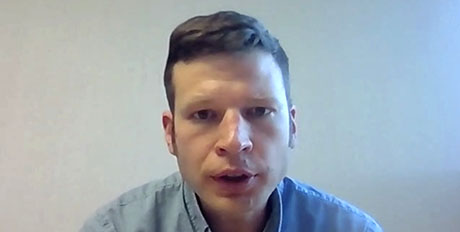
While the omicron variant of SARS-CoV-2 carries with it less risk of a serious sickness, it still is a dangerous and sometimes deadly disease, and children should be protected from it, said Dr. Steven Schulz, RRH pediatrician and medical director of RRH Pediatrics in Monroe County.
The same appears to hold true, so far, for the B2 variant of omicron.
Rochester Regional Health via Zoom hosted a press conference today for reporters from throughout the region. It was pegged to a recent study published by the American Medical Association that found that the omicron variant is six to eight times more likely to lead to infections for children less than five years old but resulted, percentage-wise, in fewer hospitalizations.
Still, with nearly two percent of infected children dying as a result of an omicron-variant COVID infection, the disease remains far more deadly than the flu.
Schultz said that based on the most recent CDC numbers he's seen, 1,300 children in the U.S. have died from COVID over the past two years.
"If we divide that in half, that's still way, way worse than any flu season we've had in recent history," Schultz said. "You hate to ever think that your child would be the one who would have the severe complication or the severe outcome, but it does happen and kids have died and do die from COVID."
Because omicron -- and so far B2 -- is more contagious, more children under age five are getting sick but because the variants do not seem to cause as many severe outcomes, area hospitals are not seeing many young children in the hospital.
"Kids were less likely to need to go to the ER, to be hospitalized, end up in ICU, or on mechanical ventilation in this zero to five group compared to the delta," Schultz said. "That's certainly reassuring but it also doesn't mean that it's risk-free to get omicron, especially in this age group. We definitely know that we saw kids throughout that time ending up in the hospital, even though the odds might have been a little bit less compared to delta, because more kids were getting infected, we definitely still saw lots of kids in the hospitals."
It's not just immune-compromised kids, or children with other health issues, who are getting hospitalized and dying from COVID, Schultz said. Healthy children are at risk, too.
The good news, Schultz said, is that we have a safe and effective vaccine -- the Phizer vaccine -- available to children over the age of five.
"We know that vaccination is still the most effective way to keep children safe," Schultz said. "The COVID vaccine is safe. It's effective. It significantly reduces the chances of ending up in the hospital. So anybody who has children five years of age and up, I definitely encourage getting the COVID vaccine right now."
Since children under age five cannot be vaccinated, the best way to protect them, Schultz said, is for everybody in a household over age five to get vaccinated.
"You're protecting the younger child as well," Schultz said. "The other thing that we know, with all of this, of course, is still that masking and social distancing works. And it's not a coincidence that, since the mask mandate has been removed in early March, we're suddenly seeing increasing rates of COVID as well as influenza. There's, there's no question about it."
He noted that the positivity rate for COVID tests in the region has jumped from a recent low of three percent to 10 percent. That's no coincidence, he said, and tied directly to the lifting of mask mandates.
Schultz has a young son who wears a mask to school every day. Not only does it provide an extra layer of defense for him, Schultz said, it also helps other children in the school. There are children in his class who have moderate to severe immunosuppression.
"I completely agree that it's a greater good for the community as a whole to wear masks," Schultz said.
He disagrees with those who say masks harm children's interpersonal development.
"There have been lots of studies that actually show that it's not the case, that kids are still able to read facial expressions, that kids are still learning those interactions," Schultz said.
The other way to protect children, and others,, Schultz noted, is for parents of symptomatic young ones is to keep them home.
"There's not really any way to tell COVID from any other viral illness, based on symptoms alone," Schultz said. "A runny nose, congestion, cough, fever, even GI symptoms, they can happen with a variety of viral illnesses. Sometimes we can test to name those viruses, whether it's COVID, whether it's flu, but sometimes it's one of the other of hundreds of viruses that are out there. So if there's a suspicion or a question, especially if you have a child going to school, or daycare, or a large family gathering coming up, where there's a higher risk of transmission between people, it's really important to have your child seen and evaluated by a healthcare provider to make sure that it's not COVID In those situations."
